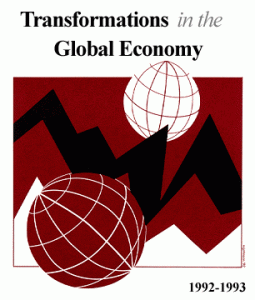- About this Program
- 2012 Conflict in the 21st Century
- 2011 Our Nuclear Age: Peril and Promise
- 2010 South Asia: Conflict, Culture Complexity, and Change
- 2009 Cities: Forging an Urban Future
- 2008 Global Poverty and Inequality
- 2007 Global Crises: Governance and Intervention
- 2006 The Politics of Fear
- 2005 Oil and Water
- 2004 Dilemmas of Empire and Nation Building
- 2003 Sovereignty and Intervention
- 2002 Global Inequities
- 2001 Race and Ethniciity: A Global Inquiry
- 2000 Global Games: Sports, Politics, and Society
- Symposium
- 1999 Global Crime, Corruption, and Accountability
- 1998 Exodus and Exile: Refugees, Migration, and Global Security
- 1997 The Future of Democracy
- 1996 Religion, Politics, and Society
- 1995 20/20 Visions of the Future
- 1994 Ethnicity, Religion and Nationalism
- 1993 Transformations in the Global Economy
- International Symposium
- 1992 - International Security: The Environmental Dimension
- 1991 Confronting Political and Social Evil
- 1990 The Militarization of the Third World
- 1989 Drugs, International Security and U.S. Public Policy
- 1988 Foreign Policy Imperatives for the Next Presidency
- 1988 Covert Action and Democracy
- 1987 The West Bank and Gaza Strip
- 1986 International Terrorism
- News
- Press Clips
- Calendar
- Resources
EPIIC Archives
1993 Transformations in the Global Economy

|
|
Global security is now understood in economic terms, as indicated in headline stories such as the narrowly-averted trade war between the United States and the European Community; the internal financial and political disarray in Japan; the proliferation of arms sales; the economic collapse of the former Soviet Union; the famine in Somalia; the financial revolution in the global market for capital; and the global diffusion of technology. In the pursuit of security, what are the linkages? What potential exists for conflict or cooperation? What interests are uniquely national and which global?
This symposium was an inquiry into the evolving nature of modern economic sovereignty and the conduct, accountability, and transnational nature of the global economy.
Will the end of the Cold War mark the beginning of an era of the "battle of the capitalisms"? Has America been economically compromised by an antiquated pursuit of geopolitical hegemony? How will the world's intelligence agencies be involved in "economic warfare"? Will economic sanctions become more or less effective in international affairs? What is the future of GATT? Are "national" corporations obsolete? What is the future of China and Eastern Europe in the world economy? What are the universal possibilities of distributive justice? What is the relationship between democracy and development? What are the linkages between trade and development? What is the relationship between "hot money," capital flight and the international debt crisis? How will energy security be provided for?
Among the topics we examined were the changing and controversial U.S.-Japan relationship; the impact of the emerging European Community and the growing schisms within the proposed union; the tensions inherent in international technology transfers; the possibilities for new international economic regimes; the economic reconstruction of war-devastated areas; overcoming global poverty; the potential of ecological economics and sustainable development; and issues of conversion and dismantling the militarized Cold War economy.
Finally, we paid special attention to the implications of unregulated, untaxed and unaccountable sectors of the global political economy, epitomized by the activities of the Bank of Credit and Commerce International (B.C.C.I.) and the Banca Nazionale del Lavoro (B.N.L.).
We were especially pleased to present the inaugural Dr. Jean Mayer Global Citizenship Award to Dr. Amartya Sen, Lamont University Professor and professor of economics and philosophy, Harvard University, author of On Economic Equality, co-author of The Political Economy of Hunger, and 1998 Nobel laureate in economics. The award honors Dr. Jean Mayer -- President and Chancellor of Tufts University, 1976-93 -- a great friend of EPIIC throughout its first eight years. The award will be presented annually to the keynote speaker of EPIIC's international symposium.

